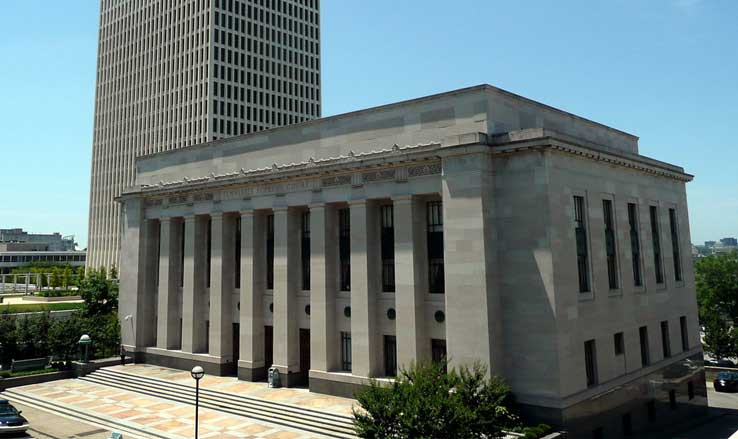Photo: Tennessee Supreme Court Building at 401 7th Avenue, Nashville. Designed by Marr and Holman and completed in 1937.
Photo Credit: Reading Tom / CC
Published June 7, 2021
By Vivian Jones [The Center Square contributor] and The Tennessee Conservative Staff –
Tennessee’s highest court heard arguments on a disputed school choice program last Thursday, June 3rd.
Tennessee’s Education Savings Accounts (ESA) pilot program, approved by the state Legislature in 2019, would provide state-funded scholarships of about $7,100 to low-income students in Nashville and Memphis – home to the state’s two lowest-performing school districts. Students would be able to use the funds to attend nonpublic schools of their choice.
A district court ruled the program unconstitutional when the two counties sued the state to stop the program. The state Court of Appeals upheld that ruling, and the state Supreme Court agreed to hear the case.
Solicitor General Andrée Blumstein represented the state Thursday in front the court, alongside attorneys Arif Panju and Brian Kelsey, representing families and schools affected by the program who intervened in the case. Nashville Metro Legal Director Bob Cooper represented the Davidson and Shelby County governments.
*** Click Here to Support Conservative Journalism in Tennessee. We can’t bring you stories about School-Choice in Tennessee without your support!***
Cooper argued the program violates the home rule provision of the Tennessee Constitution. Under that provision, the state Legislature is not allowed to pass laws that apply to only one county. Cooper also argued the program is an “unfunded mandate” and, if implemented, counties would suffer significant financial harm – between $2,400 and $4,700 per student – as they would continue to be responsible to pay for students who enroll in the ESA program.
The ESA program requires the state to provide grant funds to the districts for the first three years of the pilot to offset those costs. When asked by Justice Jeffrey Bivins whether school districts’ total funding for education would remain the same for the first three years of the program because of the grants, Cooper agreed.
“Your honor, school districts will basically break even on this,” he said. “The burden is on the counties. … When a student exits a [district], the county no longer has to pay for that student. But under the ESA act, the county has to continue to pay for that student even though that student no longer attends public school.”
Kelsey argued that the constitution’s home rule provision does not apply, as the program would operate in more than one county, and that counties’ funding would not change as a result of the program.
“Counties’ only real beef with the statute is the policy decision of where these children are educated and whether or not they go to private schools,” Kelsey said. “Statutorily, counties simply don’t have a policy role in education, their only role is one of funding, and they admitted again today, counties will basically break even.”
Funding arguments come in the midst of a continued statewide conversation on funding for public schools. Nashville and Shelby County school districts are among the worst performing in the state and blame chronic underfunding as the cause of slow rates of improvement. Nashville Mayor John Cooper has pledged to fully fund Metro Nashville Public Schools’ budget proposal this year – a $1.15 billion investment.
Shaka Mitchell, Tennessee State Director of the American Federation of Children released this statement, “We are optimistic the Tennessee Supreme Court will reverse the decision by the lower court and allow students in Shelby and Davidson Counties to access the Education Savings Account program. Thousands of families trapped in failing or low-performing schools had already signed up to participate when the program was halted as a result of the lawsuit.”
Mitchell went on to say, “School choice programs work. They empower parents with resources to find schools that better fit their unique needs and they foster innovation. These programs make both private and public schools create new and better options for all students. At American Federation for Children, we remain focused on students, not systems, and we hope for a favorable outcome in this case.”
There’s no timeline for a decision from the court, though it likely will take several weeks.







One Response
The Teachers Union should have thought about this when we have 2nd rate schools. Our drop out rate is to high, and frankly most of the teachers only care about their back pocket.